Balbharti Maharashtra State Board Class 12 Political Science Important Questions Chapter 1 The World Since 1991 Important Questions and Answers.
Maharashtra State Board 12th Political Science Important Questions Chapter 1 The World Since 1991
Complete the following statements by selecting the appropriate option.
Question 1.
The world order was dominated by the in the early part of the post-cold war area.
(a) UK
(b) Soviet Union
(c) USA
(d) EU
Answer:
(c) USA
Question 2.
The term ‘New World Order’ was first used by
(a) Woodrow Wilson
(b) Jawaharlal Nehru
(c) Joseph Nye
(d) George H. Bush
Answer:
(d) George H. Bush
![]()
Question 3.
In 1993, the World Conference on Human Rights was held in
(a) Vienna
(b) Belgrade
(c) Paris
(d) New York
Answer:
(a) Vienna
Question 4.
Market reforms were introduced in People’s Republic of China in the mid 1970s under leadership of
(a) Mao-Tse-Tung
(b) Deng Xiaoping
(c) Jinping
(d) Chou-en-Lai
Answer:
(b) Deng Xiaoping
Question 5.
Shenzhen Area is related to the region.
(a) Asia
(b) South Asia
(c) European Union
(d) South America
Answer:
(c) European Union
Question 6.
In 2007, became a member of SAARC.
(a) China
(b) Maldives
(c) India
(d) Afghanistan
Answer:
(d) Afghanistan
Question 7.
…………………. acts as a bridge between South Asia and South East Asia.
(a) BIMSTEC
(b) BRICS
(c) ASEAN
(d) SAARC
Answer:
(a) BIMSTEC
![]()
Identify the incorrect pair in every set and correct it.
Question 1.
(a) Kosovo – Serbia
(b) Catalonia – France
(c) Chechnya – Russia
Answer:
(b) Catalonia – Spain
Question 2.
(a) Nepal – SAARC
(b) Myanmar – BIMSTEC
(c) SCO – Afghanistan
Answer:
(c) SAARC – Afghanistan
Complete the following sentences by selecting the appropriate reason.
Question 1.
There were revolutions in East European States because ………………….
(a) they desired more freedom and economic wellbeing
(b) they were now aligned to the USA.
(c) of the rise of multipolarity.
Answer:
(a) they desired more freedom and economic wellbeing
Question 2.
Schengen Visa in significant because ………………….
(a) it is a kind of trade bloc.
(b) it allows individuals to travel freely in 26 Schengen area countries.
(c) it allows all European Union States free trade and travel.
Answer:
(b) it allows individuals to travel freely in 26 Schengen area countries.
![]()
State the appropriate concept for the given statements.
Question 1.
When a State gets other countries to act in ways contrary to their preferences, using coercion.
Answer:
Hard power
Question 2.
The use of violence or threat of violence with an intention to create panic in society.
Answer:
Terrorism
Question 3.
The military campaign launched by then US President, George W. Bush in response to the 9/11 terrorist attacks.
Answer:
War on Terror
Question 4.
The agreement which resulted in abolition of internal borders between five European nations in 1985.
Answer:
Schengen Agreement
Question 5.
The executive-bureaucratic arm of the EU.
Answer:
European Commission
![]()
Question 6.
This forum acts as a platform for discussion between developed and developing nations.
Answer:
G-20
Question 7.
Group of nations make special agreements regarding their economic relationships.
Answer:
Trade Bloc.
Find the odd word.
(1) Croatia, Montenegro, Serbia, Latvia
(2) Belgium, France, Spain, Germany.
(3) China, Russia, Tajikistan, Ukraine.
(4) Cambodia, Thailand, Nepal, India.
Answer:
(1) Latvia (was not created due to disintegration of Yugoslavia)
(2) Spain (not a signatory to Schengen Agreement in 1985)
(3) Ukraine (not a member of SCO)
(4) Cambodia (not a member of BIMSTEC)
Expand the following abbreviations.
BIMSTEC
SAARC
SAFTA
NATO
UNTAC
ASEAN
EEC
ECSC
Answer:
BIMSTEC – The Bay of Bengal Initiative for Multi Sectoral Technical and Economic Cooperation.
SAARC – South Asian Association for Regional Cooperation.
SAFTA – South Asian Association Free Trade Area.
NATO – North Atlantic Treaty Organisation.
UNTAC – United Nations Transitional Authority in Cambodia.
ASEAN – Association of South East Asian Nations.
EEC – European Economic Community.
ECSC – European Coal and Steel Community.
![]()
Complete the concept maps.
Question 1.
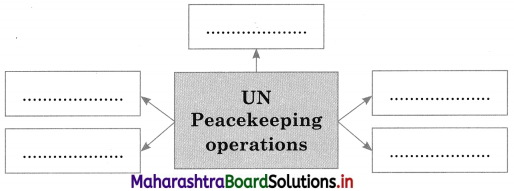
Answer:
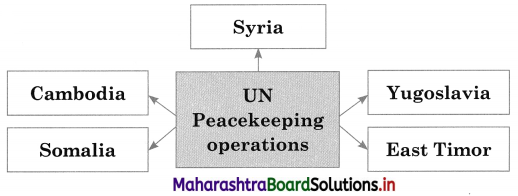
Question 2.
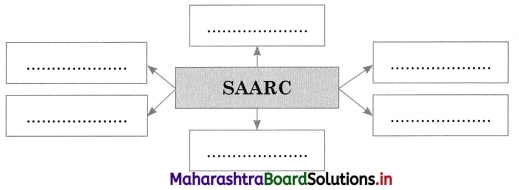
Answer:
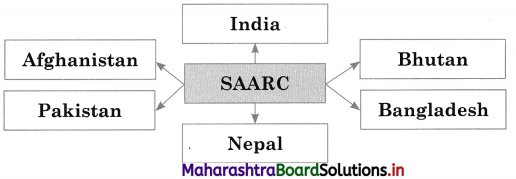
Question 3.
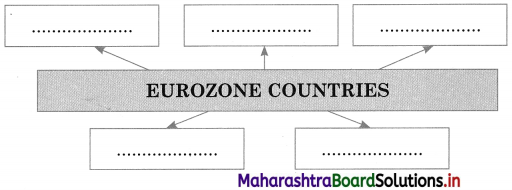
Answer:
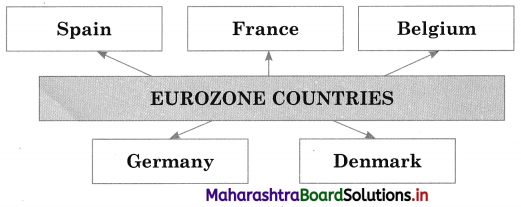
Observe the maps in the textbook and answer the following questions.
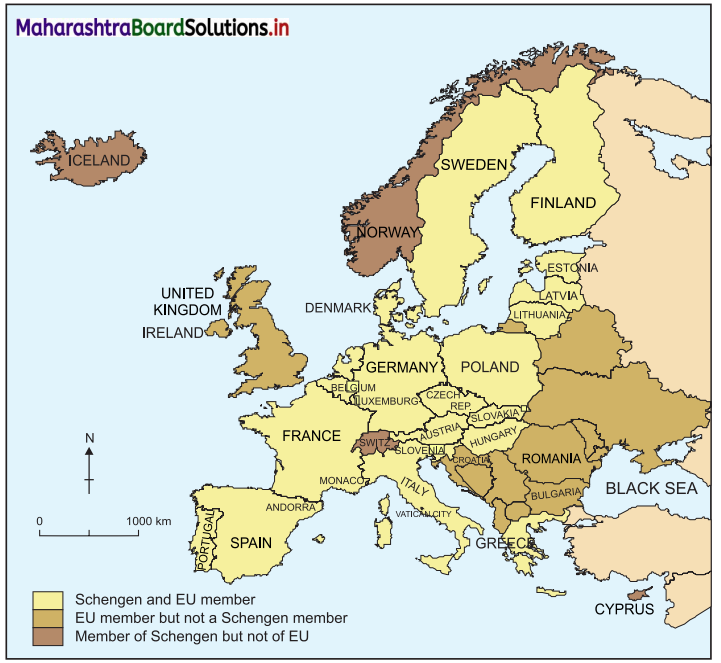
Question 1.
Name any four countries in the Schengen area.
Answer:
Sweden, Denmark, Germany, Belgium, France.
Question 2.
Name any two non-European Union countries within Schengen area.
Answer:
Norway, Romania, Bulgaria, Croatia.
Question 3.
Name any two countries who are EU members but not Schengen member.
Answer:
Belarus, Ukraine Serbia
![]()
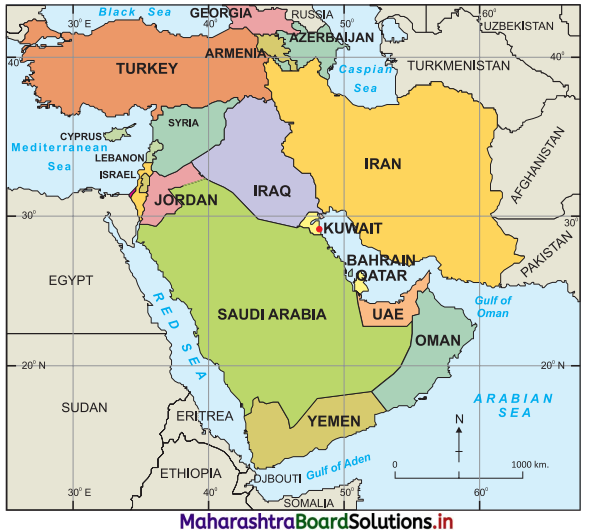
Question 1.
Write two neighbouring countries of Iraq.
Answer:
Syria, Jordan, Iran, Kuwait.
Question 2.
Write two African nations bordered by the Red Sea
Answer:
Sudan, Eritrea
Question 3.
Write two countries bordered by the Gulf of Aden.
Answer:
Yemen, Somalia, Djbouti.
![]()
Question 4.
Write two ‘seas’ bordering Turkey.
Answer:
Black Sea, Mediterranean Sea.
State whether the following statements are true or false with reason.
Question 1.
‘New World Order’ described by US President George H. Bush was the first expression of the unipolar world order.
Answer:
This statement is True.
- During the Gulf war (Iraq invasion of Kuwait), the USA led a multinational force to free Kuwait from Iraqi control. Countries of the NATO, Arab States, as well as Israel, China, Soviet Union, etc., supported the US in this action.
- Eventually, the meaning of the term ‘New World Order’ came to imply US dominance in matters of security at the global level i.e. unipolarity.
Question 2.
Terrorism in the world today is different from traditional forms of terrorism.
Answer:
This statement is True.
- Traditional forms of terrorist activity included hijackings, bombings, assassinations of political leaders, etc. This mainly targeted institutions of the government and was associated with separatist movements or struggles for the rights of some specific people e.g., I.R.A.
- Modern day terrorism is motivated by an abstract ideology towards abstract goals and the operations are global in nature e.g., 9/11 attacks in the USA were carried out by Osama Bin Laden led Al-Qaeda based in Afghanistan.
Question 3.
There has been a shift from unipolar to multipolar world order in recent times.
Answer:
This statement is True.
- In the post Cold War era, due to it’s military, technological and economic might, the USA was the only superpower.
- However, in recent times, the dominant position of USA has been directly or indirectly challenged by factors such as
(a) European Union, (b) military resurgence of Russia (c) rise of Asia through the presence of China, Japan and India in the global world order, (d) new regional organisations like BRICS, BIMSTEC, etc.
![]()
Explain the correlation between the following.
Question 1.
Rise of China and Russia and Multipolarity
Answer:
After the end of the Cold War, USA emerged as the only super power due to it’s technological and military superiority and the use of‘Soft Power’. However, this dominant position of the USA has been challenged in recent times by China and Russia.
China’s rise to global prominence began in the mid 1970s due to market reforms introduced by Deng Xiaoping. China aims to create a sphere of influence in Central and East Asian regions through ambitious projects like One Belt One Road and China Pakistan Economic Corridor. China is also building up it’s naval and air power in order to back up it’s claims in the South China Sea.
Russia has emerged as an energy superpower due to its progress in oil and gas production and military assertiveness. It continues to influence Central and Eastern Europe. Both China and Russia are founding members of the Shanghai Cooperation Organisation. Thus, China and Russia have also become significant centres of power, challenging US dominance.
Question 2.
UN Peacekeeping – Conflict zones.
Answer:
One of the main tasks of the UN Peacekeeping is to prevent conflicts from escalating or recurring, to maintain peace and to protect human rights of the affected people. The UN thus intervened in Cambodia, Somalia, Yugoslavia, Afghanistan, Syria, etc.
The United Nations does not have its own army. But in order to maintain international peaee and security, member States of the United Nations, have created a peacekeeping force out of their own military resources. This force known as UN Peacekeeping Force. The Peacekeepers are sent to conflict-prone or war zones, based upon UN Security Council recommendations, often when ceasefires are established.
Answer the following
Question 1.
Elaborate on ‘Self determination based on ethnic identity’ that arose after the end of the cold war.
Answer:
In 1991, the Soviet Union disintegrated leading to the creation of many new States. The revolutions in the East European countries also led to many new countries being formed. All this was against communist regimes, as the people within these regions desired freedom and economic progress. Ethnic identity of various people in the region became stronger, leading to the demand for creation of new States based on ethnic identity. Some examples of this trend are-
- Yugoslavia split into Croatia, Serbia, Bosnia, Slovenia, etc.
- Czechoslovakia split into Czech Republic and Slovakia in 1993.
- Former Soviet Union disintegrated into fifteen States such as Russia, Armenia, Belarus, Ukraine, Estonia, etc.
Creation of new States based on ethnic nationalism was also seen in other parts of the world for e.g.
- East Timor (became independent from Indonesia).
- Eretria (became independent from Ethiopia).
- South Sudan (became independent from Sudan).
- Chechnya (wants independence from Russia).
![]()
Question 2.
Describe how USA became the only superpower after the end of the cold war.
Answer:
In 1991, the Soviet Union disintegrated and the Cold War ended. This led to the end of an international order dominated by the two superpowers i.e., USA and Soviet Union. Bipolarity gave rise to unipolarity. During the invasion of Kuwait by Iraq, the USA took the initiative and led a multinational force to free Kuwait. The US President, George H. Bush used the term ‘New World Order’ to describe the existing global situation. The US initiative was supported by China, Israel, Arab States, Soviet Union and countries of the NATO. Soviet Union was facing internal problems so not much opposition was possible against the USA. Thus, the term ‘New World Order’ implied American dominance and it’s leadership in matters of security was accepted at the global level. This was the first expression of the unipolar world order.
Answer the following question in detail with help of given points.
Question 1.
Discuss the European Union with help of given points.
(a) History
(b) European Commission
(c) European Parliament
(d) European Council
(e) European Court of Justice
Answer:
(a) History – The European Coal and Steel Community (ECSC) and European Economic Community (EEC) were created to foster economic interdependence. On 7th February 1992, the Maastricht Treaty was signed to create the European Union. This led to expansion of spheres of cooperation to include internal affairs, judicial matters, foreign policy, etc. The Euro (€) is the official currency of 19 out of 28 countries of the EU. These nations are collectively called ‘Eurozone’.
(b) European Commission – The Commission is the executive bureaucratic arm of the EU. It is mainly responsible for drawing up proposals for new European legislation,and it implements the policy decisions of the European Parliament and the Council of the EU.
(c) European Parliament – The European Parliament is composed of 751 Members, who are directly elected every five years. It is a body entrusted with legislative, supervisory, and budgetary responsibilities.
(d) European Council – The structure of the European Council consists of the Presidents or Prime Ministers of each member State, accompanied by their foreign ministers, and a full¬time President of the European Council. The European Council meets four times a year and provides strategic leadership for the EU.
(e) European Court of Justice (ECJ) – The ECJ interprets, and adjudicates on, EU law and treaties. As EU law has primacy over the national law of EU member States.
![]()
Question 2.
Elaborate on developments in the post-cold war period.
(a) Rise of new States
(b) Emergence of unipolarity
(c) Humanitarian intervention
(d) Terrorism
(e) Multipolarity and Regionalism
Answer:
The disintegration of the Soviet Union ended the era of the Cold War as well as the East-West division of the world. Developments in the post-Cold War period can be analyzed through five dimensions.
(a) Rise of new States – The East European revolution of 1989, led to assertion of ethnic nationalism based on the right to self determination. It was an expression of the middle class for freedom and economic well being as well as for autonomy and eventually for independence. Many new States were created based on ethnic identity for e.g., Yugoslavia split into States like Croatia, Serbia, Bosnia-Herzegovina, etc. Similarly, 15 new States were created after the collapse of the Soviet Union.
(b) Emergence of unipolarity – In 1990, Iraq invaded Kuwait. The USA led a multinational force to free Kuwait from Iraqi control. The US President, George H. Bush had described this victory as ‘New World Order’ as the multinational support to the USA came from NATO, Israel, Soviet Union, China and many Arab countries. After the collapse of the Soviet Union in 1991, the world became unipolar and the New World Order implied US dominance and leadership in matters of global security. They had political and economic dimensions. The US employed “Soft Power” method i.e., without use of coercion or military force but through socio-cultural and economic influence.
(c) Humanitarian intervention – There have been many instances of ethnic conflicts and bloodshed in the creation of new States particularly in Bosnia, East Timor, Somalia, Cambodia, etc. The UN Peacekeeping Force has intervened in a number of conflict situations to bring about peaceful resolution of the conflict as well as to maintain peace and protect human rights. Humanitarian intervention refers to an increasing awareness about the significance of human rights and the need for their protection.
(d) Terrorism – Terrorism is defined as the use of violence, or the threat to use violence with an intention to create panic in society, in the pursuit of political/religious/ideological goals. Terrorist groups indulge in hijackings, bombings, etc., and are usually associated with separatist movements. Modern day terrorist operations are global in nature. Some instances of terrorist attacks post 1991, include Al-Qaeda attacks on 11th September 2001 in Washington D.C, Bali (2002), Mumbai (2008), etc.
(e) Multipolarity and Regionalism – In the post cold war era, the USA emerged as the only superpower. However, in recent times, the dominant position of the USA has been challenged due to the rise of Asian nations like China, Japan and India creation of the European Union; military resurgence of Russia and growing importance of regional organisations like SAARC, etc.
Regionalism refers to creation of regional organisations based on geographical proximity or on common ideological, political, economic concerns in areas like communication, health, energy, education, etc. In the 1960s organisations like ASEAN focused on economic issues.
![]()
Question 3.
Describe the following regional organisations in the post cold war era.
(a) European Union
(b) SAARC
(c) BIMSTEC
(d) Shanghai Cooperation Organisation
(e) G-20
Answer:
(a) EuropeanUnion-The European CoalandSteel Community (ECSC) and European Economic Community (EEC) were created to foster economic interdependence. On 7thFebruary 1992, the Maastricht Treaty was signed to create the European Union. This led to expansion of spheres of cooperation to include internal affairs, judicial matters, foreign policy, etc. The Euro (€) is the official currency of 19 out of 28 countries of the EU. These nations are collectively called Eurozone.
The Schengen Agreement (1985) was signed by France, Germany, Belgium, Netherlands and Luxembourg. Today 22 countries are part of the Schengen Area which is an area without internal borders. The EU functions on four key institutions viz. European Commission, European Parliament, European council and European court of Justice. The UK formally ended it’s membership of the EU on 31st January 2020.
(b) SAARC – It was formed in 1985 at Dhaka with seven members viz. Bangladesh, Bhutan, India, Maldives, Nepal, Pakistan and Sri Lanka. In 2006, SAFTA was activated. Afghanistan joined SAARC in 2007. There are also nine observers such as EU, China, UK, USA, etc.
(c) BIMSTEC – The Bay of Bengal Initiative for Multi Sectoral Technical and Economic Cooperation was established in 1997. It comprises of five countries from South Asia viz. Bangladesh, Bhutan, India, Nepal, Sri Lanka and two countries from South-East Asia viz. Myanmar, Thailand. BIMSTEC aims to facilitate collaboration and rapid economic development among countries lying in adjacent areas of the Bay of Bengal.
(d) Shanghai Cooperation Organisation (SCO) – It was founded in 2001 in Shanghai by the leaders of China, Russia, Kazakhstan, Kyrgyzstan, Tajikistan and Uzbekistan. In 2016, India and Pakistan joined the SCO. The focus of SCO is to bring about peace, stability and cooperation in the Eurasian region.
(e) G-20 – This forum was created in 1999 with the aim to discuss policies relating to financial stability. It includes developed countries like USA, UK, France, Germany the EU as well as developing countries like Argentina, Brazil, India.